
Ocean Science
Scope & Guideline
Diving into Innovative Oceanic Discoveries
Introduction
Aims and Scopes
- Ocean Dynamics and Circulation:
Research focusing on the physical processes governing ocean currents, tides, and circulation patterns, including the impacts of climate change on these systems. - Marine Ecosystems and Biogeochemistry:
Studies related to the interactions between physical ocean processes and marine ecosystems, including nutrient cycling, phytoplankton dynamics, and the effects of ocean acidification. - Remote Sensing and Modeling Techniques:
Application of advanced remote sensing technologies and numerical modeling approaches to study ocean processes, enhance data assimilation, and improve predictive capabilities. - Climate Change Impacts:
Investigations into how climate change influences ocean temperatures, sea level rise, and marine biodiversity, with a focus on adaptive strategies and mitigation. - Marine Pollution and Conservation:
Research addressing the sources, distribution, and impacts of marine pollution, as well as studies aimed at conservation and sustainable management of marine resources.
Trending and Emerging
- Machine Learning in Ocean Science:
The utilization of machine learning techniques to analyze ocean data, predict marine phenomena, and improve modeling accuracy is rapidly gaining traction, reflecting the integration of artificial intelligence in environmental science. - Climate Change Adaptation Strategies:
Research focusing on the development and assessment of adaptation strategies to mitigate the impacts of climate change on marine systems is increasingly prevalent, indicating a proactive approach in ocean science. - High-Resolution Modeling and Observation:
There is a growing emphasis on high-resolution modeling and observational studies that provide detailed insights into ocean dynamics, including the effects of mesoscale processes on larger scale phenomena. - Interdisciplinary Approaches:
Emerging themes reflect a trend towards interdisciplinary research that combines oceanography with fields such as ecology, atmospheric sciences, and social sciences to address complex marine challenges comprehensively. - Ecosystem Health and Resilience:
Research focused on assessing the health and resilience of marine ecosystems to stressors such as pollution, climate change, and overfishing is increasingly important, highlighting the need for sustainability in ocean resource management.
Declining or Waning
- Historical Oceanography:
Research that focuses on long-term historical data analysis and historical oceanographic events appears to be declining, as the journal shifts towards more contemporary and predictive studies. - Traditional Oceanographic Methods:
The reliance on traditional methods of ocean study, such as basic in situ measurements without integration of advanced technologies, is decreasing in favor of more innovative and high-resolution approaches. - Localized Case Studies:
There is a noticeable reduction in studies that focus solely on localized case studies without broader implications or comparative analysis across different regions, reflecting a shift towards more global and integrative perspectives.
Similar Journals
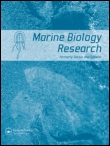
Marine Biology Research
Innovating research for thriving ocean ecosystems.Marine Biology Research is a premier journal published by Taylor & Francis, focusing on the dynamic field of marine biology and its intersecting realms of aquatic science, ecology, and oceanography. Since its inception in 2005, this journal has served as a crucial platform for researchers and professionals to disseminate their findings, with a vision extending to 2024 and beyond. The journal is recognized with a Q3 quartile ranking in both Aquatic Science and Ecology, Evolution, Behavior and Systematics, underscoring its growing influence in these fields as evidenced by its Scopus rankings. Located in the United Kingdom, Marine Biology Research aims to foster collaboration and innovation through open access options, facilitating knowledge exchange among the academic community. With a steady commitment to advancing marine sciences, this journal is an invaluable resource for those dedicated to understanding and preserving our ocean ecosystems.

International Journal of Marine and Coastal Law
Charting New Territories in Marine and Coastal LawThe International Journal of Marine and Coastal Law, published by Martinus Nijhoff Publishers, is a leading academic periodical dedicated to the exploration of legal aspects related to marine and coastal environments. With a strong emphasis on interdisciplinary research, this journal serves as a vital resource for scholars, practitioners, and policymakers engaged in areas such as environmental science, oceanography, and law. Since its inception in 1986, the journal has continuously evolved to address contemporary challenges in the field, boasting a commendable Q2 ranking in Law and Q3 rankings across various relevant categories. The journal facilitates rigorous discourse on pressing issues, providing a platform for high-quality research that aims to inform legal frameworks and enhance sustainable practices. Although it does not offer open access, the journal’s impact extends to its notable Scopus rankings and its essential role in shaping legal discourse on marine and coastal management. Researchers and professionals will find invaluable insights and scholarly contributions that are crucial for advancing knowledge and policy in this critical area of study.

Frontiers in Marine Science
Transforming Marine Research into Actionable InsightsFrontiers in Marine Science, published by FRONTIERS MEDIA SA, stands as a leading open-access journal dedicated to advancing our understanding of marine ecosystems and their interconnectedness with global environmental systems. With a focus that spans a range of vital sub-disciplines including Aquatic Science, Oceanography, and Ocean Engineering, this journal has achieved prestigious rankings within the Q1 category in multiple areas as of 2023. The journal, thriving since its inception in 2014, promotes high-quality, peer-reviewed research that addresses critical challenges in marine and environmental science, making it an invaluable resource for researchers, professionals, and students alike. Located in Switzerland, Frontiers in Marine Science is committed to accessible scientific knowledge, boasting an impressive impact through a wide array of contributions from the global community. The journal's aim is to foster collaborative research efforts and innovative responses to the pressing issues facing our oceans and waterways today.
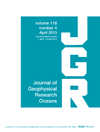
JOURNAL OF GEOPHYSICAL RESEARCH-OCEANS
Connecting Ocean Science with Global ImpactJournal of Geophysical Research-Oceans is a premier interdisciplinary journal published by the American Geophysical Union, focused on the dynamic field of ocean sciences. With a rich history dating back to 1986, this journal has become a pivotal platform for researchers, providing a wealth of data and innovative insights into oceanographic processes and their essential role within the Earth's system. The journal enjoys an impressive impact factor and consistently ranks in the Q1 quartile across numerous categories, including Earth and Planetary Sciences and Oceanography, making it a respected source for cutting-edge research and reviews. Notably, it holds significant positions within Scopus rankings, further emphasizing its importance in shaping the scientific discourse surrounding oceanic phenomena. While available through subscription, the Journal of Geophysical Research-Oceans remains an invaluable resource for academics, industry professionals, and students eager to deepen their understanding of ocean dynamics and geophysical interactions.
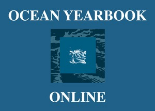
Ocean Yearbook
Advancing Understanding of Maritime Challenges and SolutionsOcean Yearbook, published by BRILL, is a leading academic journal in the field of maritime law and ocean governance, providing a comprehensive platform for researchers and practitioners in this vital area. With an ISSN of 0191-8575 and E-ISSN 2211-6001, this journal offers valuable insights and critical analyses on contemporary issues affecting the world's oceans, promoting interdisciplinary dialogue among scholars in law, environmental studies, and policy-making. Currently ranked in the Q2 quartile for Law, this journal is positioned among the top-tier publications, reflecting its commitment to academic excellence and relevance. Ocean Yearbook is essential reading for those looking to stay abreast of legal developments and emerging challenges in ocean governance, contributing significantly to policy discussions and academic scholarship worldwide. Its accessibility through subscription, combined with its ongoing commitment to high-quality research, makes it an indispensable resource for students, researchers, and professionals dedicated to understanding and protecting marine ecosystems.

TELLUS SERIES A-DYNAMIC METEOROLOGY AND OCEANOGRAPHY
Exploring the Dynamics of Climate and Marine SystemsTELLUS SERIES A-DYNAMIC METEOROLOGY AND OCEANOGRAPHY, published by Stockholm University Press, is a prestigious open-access journal that has been at the forefront of research in the fields of atmospheric science and oceanography since its inception in 1983. With an enduring commitment to disseminating high-quality, peer-reviewed research, the journal has achieved a commendable impact factor, securing its position in the Q2 category for both Atmospheric Science and Oceanography as of 2023. The journal's significant reach is reflected in its Scopus rankings, being positioned at Rank #51 in Oceanography and Rank #77 in Atmospheric Science. With open access established since 2012, TELLUS SERIES A serves not only as a vital resource for researchers and professionals in these dynamic fields but also as an inclusive platform for budding scholars and students. Engaging with this journal allows readers to stay updated on the latest developments and groundbreaking discoveries that advance our understanding of climate systems and marine environments. Its editorial ethos emphasizes the cross-disciplinary integration of atmospheric and oceanographic studies, making it an essential publication for anyone invested in environmental research and policy.

Indian Journal of Geo-Marine Sciences
Charting New Territories in Oceanographic StudiesThe Indian Journal of Geo-Marine Sciences, published by the NATIONAL INSTITUTE OF SCIENCE COMMUNICATION & INFORMATICS (NISCAIR), serves as a vital platform dedicated to the dissemination and advancement of knowledge in the field of marine and geosciences. As an open-access journal, it allows for improved visibility and accessibility of research findings to a global audience, enabling researchers, professionals, and students to share insights into oceanography and related disciplines. With a publication history spanning from 2007 to 2010 and continuing from 2012 to 2024, it has established itself within the academic community as a reliable source of innovative research, despite being classified in Q4 of Oceanography and holding a Scopus rank that places it in the 27th percentile. This journal is particularly relevant for those investigating marine ecosystems, geological oceanography, and their interconnections, thus playing an essential role in fostering understanding and communication within this important area of scientific inquiry.

Journal of Ocean University of China
Advancing Ocean Science for a Sustainable FutureThe Journal of Ocean University of China, ISSN 1672-5182, is a premier academic journal dedicated to advancing the fields of Ocean Engineering and Oceanography. Published by the esteemed Ocean University of China, the journal serves as a vital platform for researchers, professionals, and students to disseminate groundbreaking findings and foster collaboration in marine science and engineering. With a commitment to quality, the journal currently holds a Q3 ranking in both Ocean Engineering and Oceanography as of 2023, indicating its significant contributions within the scientific community. The journal's scope encompasses a wide range of topics including marine technology, ecological studies, and coastal management, all aimed at enhancing the understanding and utilization of oceanic resources. Although currently not Open Access, it continues to attract submissions from renowned scholars, ensuring a diverse and innovative range of research. By providing access to cutting-edge research and practical insights, the Journal of Ocean University of China plays a critical role in shaping the future of ocean sciences and engineering.
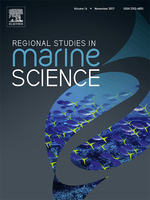
Regional Studies in Marine Science
Connecting Research to Coastal ConservationRegional Studies in Marine Science, published by Elsevier, is a leading academic journal dedicated to advancing the understanding of marine ecosystems and their regional dynamics since its inception in 2015. With an ISSN of 2352-4855, this journal is indexed in Scopus and has achieved impressive ranking quartiles, notably Q2 in categories like Animal Science and Zoology, and Ecology, showcasing its relevance and impact in these fields. As of 2023, it ranks in the 79th percentile for Animal Science and Zoology, reflecting its significant contribution to academic discourse. While the journal operates under a traditional access model, its rigorous peer-review process ensures the publication of high-quality research that is crucial for understanding ecological interactions and fostering sustainable practices within marine environments. Researchers, professionals, and students alike will find this journal an invaluable resource for the latest findings and advancements in marine science, as it strives to bridge the gap between research and practical application at regional and global levels.
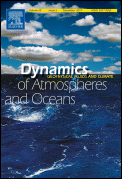
DYNAMICS OF ATMOSPHERES AND OCEANS
Bridging Disciplines for a Sustainable FutureDYNAMICS OF ATMOSPHERES AND OCEANS, published by Elsevier, is a renowned journal that has established itself as a vital resource in the fields of atmospheric science, oceanography, and geology. With a rich publication history stretching from 1976 to 2024, this journal provides a platform for high-quality research that addresses the complex interactions between the atmosphere and oceans, which are critical to understanding climate change and environmental systems. It enjoys a respectable impact factor and a reputable position within its category quartiles, specifically noted as Q2 in critical domains such as Computers in Earth Sciences and Oceanography. Researchers and professionals benefit from its indexed coverage, featuring a Scopus ranking that places it among the leading journals in its categories. Although it is not an open-access journal, readers can access its cutting-edge articles through institutional subscriptions or individual purchases. The journal aims to foster cross-disciplinary dialogue and innovation by publishing original research, reviews, and insightful commentary, making it a cornerstone for scholars, students, and practitioners committed to advancing knowledge in the dynamic interplay of Earth's atmospheric and oceanic systems.